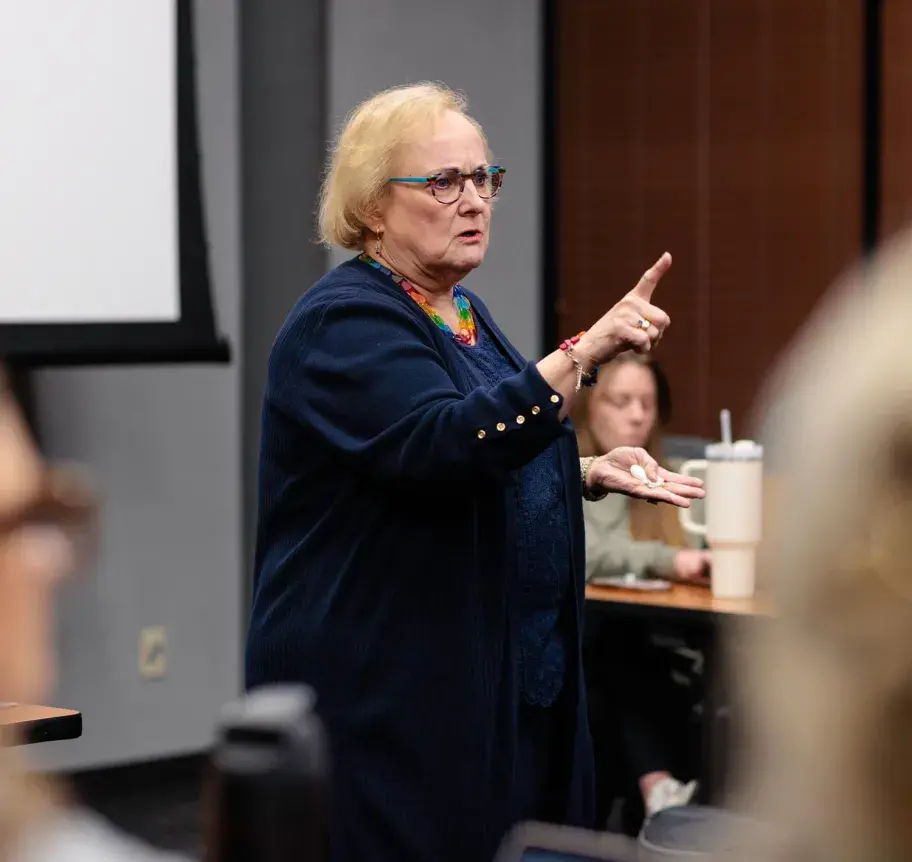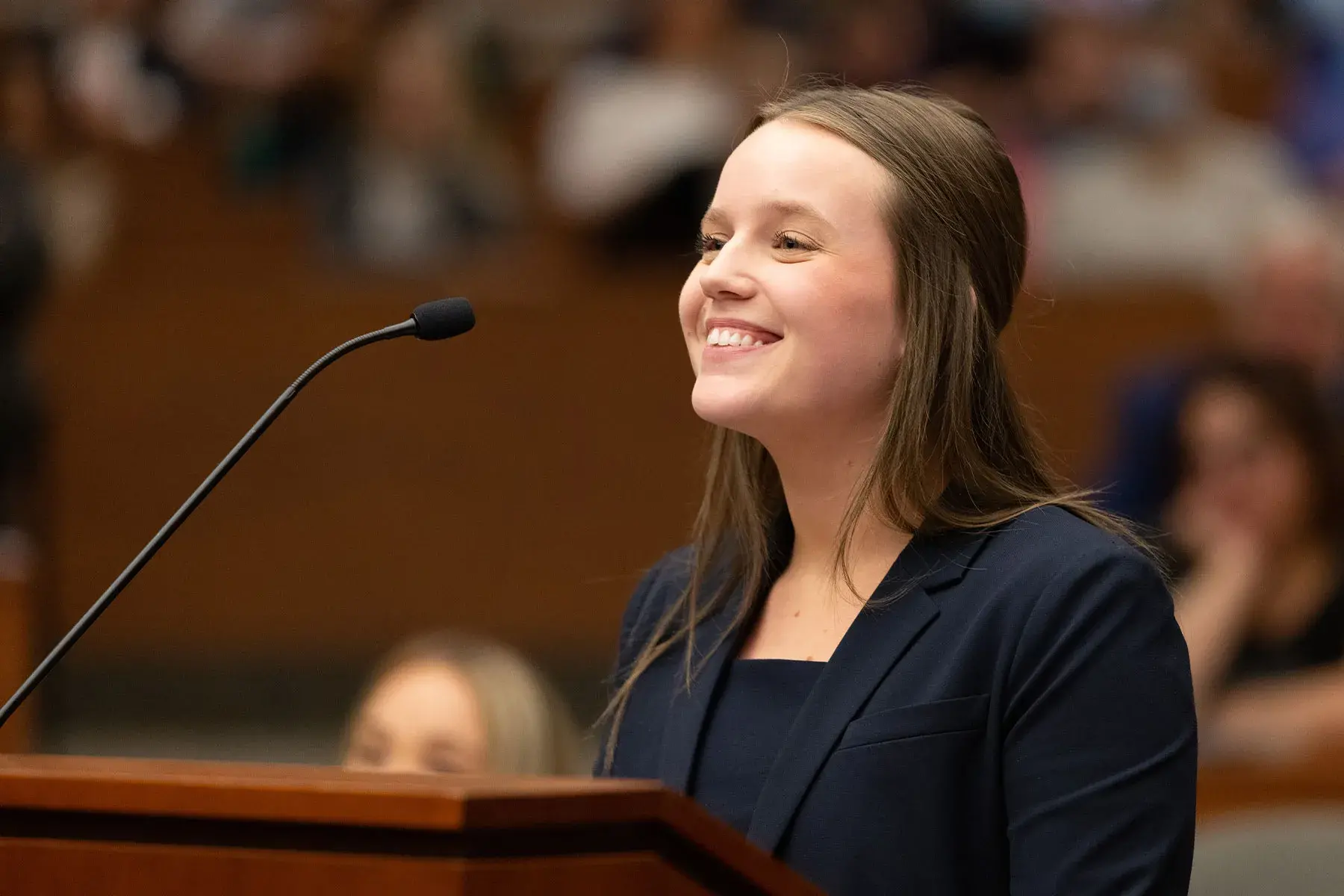
Juris Doctor Degree - Law
A Juris Doctor degree (JD) from Creighton University School of Law offers you a purposeful education established on academic excellence, social justice and personal growth. Caring professors who have earned outstanding reputations will mentor you. You’ll learn in small classes where individual attention is paramount. You’ll have access to facilities, such as our exceptional law library, that inspire learning. And you’ll benefit from a range of experiential learning and career opportunities. Whether you begin practicing law or serve as a judicial clerk after graduation, your JD law degree at Creighton University will help you develop the skills for seeking justice in the world.
Do Well While Doing Good
Your legal education at the Creighton University School of Law will lead you to find your place in the world and discover what is uniquely yours to do. As a juris doctor law degree student, you’ll gain the insights, tools, techniques and skills to ethically and successfully practice law in the real world. You will also learn to analyze and solve legal problems; critically and creatively address challenges; and exercise sound, practical judgment.
The School of Law will help you develop these abilities in alignment with Ignatian values, including personal and professional formation and seeking justice.
Choose Your Program Pace
Accelerated
The Accelerated JD Program at Creighton University School of Law is tailored to busy adult learners and recent college graduates who are eager to enter the legal profession. In the two-year program, you’ll receive the same education as students in the traditional JD track, but you’ll begin taking courses sooner—during the first summer of the program. By completing your degree faster, you’ll ultimately launch your legal career sooner.
How it Works
The Accelerated JD program is available to any student who has been accepted to the Creighton University School of Law. To participate in this accelerated program, simply email the Law School Admissions Office at least one week prior to summer term. The admissions process for the Accelerated JD program is the same as for the standard Juris Doctorate program.
You’ll start the program in May, completing courses in the summer term before your classmates in the traditional JD program begin in August. Otherwise, the programs are similar, with the same credit hour requirements, courses and professors. You’ll also have the same opportunities to participate in law journals, legal clinics, externships and judicial clerkships. However, because your studies will be intense, we do not recommend working during your first year.
Typically, you’ll graduate in August or December of what would have been your third year in the traditional JD program. Note that while students can join the Accelerated JD program after their first year of the traditional program, they may be unable to enroll in certain capstone courses, and the School of Law can’t guarantee an August graduation.
Sample Schedule
To obtain your JD, you must earn 90 total credit hours. Although there is some flexibility in the Accelerated JD program, here is what your schedule may look like:
Summer Term 1 (13 hours)
Contracts 1 (3)
Contracts 2 (3)
Criminal Law (3)
Torts (4)
Fall Semester 1 (15-16 hours)
Civil Procedure 1 (3)
Legal Research & Writing I (2)
Property (4)
Electives (6-7)
Spring Semester 1 (16-17 hours)
Civil Procedure II (3)
Constitutional Law (4)
Legal Research & Writing II (3)
Electives (6-7)
Summer Term 2 (12-14 hours)
Required Courses
Electives
Fall Semester 2 (16-17 hours)
Legal Research & Writing II (3)
Remaining required courses
Electives
Spring Semester 2 (16-17 hours)
Electives (16-17)
In the summer of the second year, you may select from the following courses (offerings may vary) shown below. Note that these courses are three credits each; the exception is Business Associations, which is four credits.
Advanced Legal Writing and Drafting
Alternative Dispute Resolution
Business Associations
Client Interviewing and Legal Counseling
Commercial Contract Drafting
Evidence
Externships
First Amendment Freedom of Speech
From Nuremberg to the Hague*
International Criminal Law*
Negotiations
Professional Responsibility
*Taught in Germany
Scholarships are fully applicable to students in the accelerated program. Scholarships awarded on an annual basis will be adjusted to include a summer term for that year. It will be increased by 50% to cover three semesters (summer, fall and spring) instead of two. If you have a renewable scholarship, you may renew it for your second summer of law school based upon your class standing in summer and fall. Your scholarship for your final two semesters will be renewable based upon your class rank in summer, fall and spring.
Traditional Full Time
Our traditional full-time JD program is three years and begins each fall. Students in this program are not required to take classes in the summer, allowing them to take advantage of experiential learning options in the summer via externship and internship opportunities. A student must complete 90 credit hours to graduate. That means an average of 15 credit hours each semester after completing your required first-year curriculum.
Curriculum Overview
First-Year Curriculum
Semester 1
LAW 100 Introduction to Law (0 credits)
LAW 141 1L Seminar (0 credits)
LAW 103 Civil Procedure I (3 credits)
LAW 111 Contracts I (3 credits)
LAW 117 Legal Research and Writing I (2 credits)
LAW 125 Property Law (4 credits)
LAW 131 Torts (4 credits)
Semester 2
LAW 104 Civil Procedure II (3 credits)
LAW 107 Constitutional Law (4 credits)
LAW 112 Contracts II (3 credits)
LAW 115 Criminal Law (3 credits)
LAW 118 Legal Research and Writing II (3 credits)
After completing your first year at Creighton University School of Law, you’re required to earn 58 additional hours to graduate. To achieve that, you must take an average of 15 hours in each of your last four semesters. To reduce that number, you can take summer courses.
Credit hours are awarded based on a minimum of 700 minutes of instruction per credit hour.
Second-year Curriculum
Fall Semester
Law 205 Legal Research and Writing III (3 credits)
Other Required and Elective Courses (8-15)
Required Second-year Courses (students may take these courses in either semester)
Law 203 Professional Responsibility (3)
Law 335 Business Associations (4)
Law 341 Criminal Procedure (3)
Law 355 Evidence (3)
Law 457 Trusts and Estates (3/4)
Law 429 Commercial Law (3)
Third-Year Curriculum
Fall Semester
Required and Electives Courses (10-17)
Spring Semester
Required and Elective Courses (10-17)
Experiential Learning Requirement (see details below)
Externships
Externships offer Creighton law students the opportunity to earn credit for unpaid work in the public sector. You’ll earn at least three credit hours and be graded on a satisfactory/unsatisfactory basis.
Creighton helps connect students to externships, and past students have connected with a wide variety of opportunities. They have completed externships in the offices of county attorneys, city attorneys, public defenders, judges, nonprofit hospitals, universities and other nonprofits. They’re on campus—and across the state, the country and even the world. Some require senior certification; and some have course prerequisites.
Reduced Schedule or Part Time
Interested in earning a JD but can’t attend school full time? At Creighton, you can attend classes with full-time students but take course loads suited to busy lifestyles. Courses are offered throughout the day during summer, fall and spring semesters. You have up to six years to complete the requirements for graduation, and you may elect to move into a full-time JD Program. Consultation with your Sr. Associate Dean for Academic Affairs or your academic advisor is a must for successful advancement toward a degree.
Part-time students are eligible for scholarships if they would qualify for scholarships as a full-time student. Scholarships are awarded on a per credit hour basis.
3 + 3
Earn your law degree sooner. At Creighton, highly motivated undergraduate students can earn a bachelor’s degree in business or the arts and sciences and a law degree in just six years instead of seven. Students will spend three years on requirements for a bachelor’s degree and three years on requirements for a law degree. They'll save time—and money. We also offer a 3 + 3 program with the following schools: College of Saint Mary and Buena Vista University.
How the 3 + 3 Program Works
Students in this program will spend their first three years at Creighton University in the Heider College of Business or the College of Arts and Sciences. There, they will follow a specific 3 + 3 curriculum for their major. In their junior year, they will apply to Creighton University School of Law, following the same application process as regular law school applicants. If accepted, they'll forgo their senior year and start law school. Once they successfully complete their first year of law school with grades of “C” or better, they'll earn their bachelor’s degree. Two years later, their JD.
Programs with other schools are similar to this, but check with the undergraduate school for specifics.
If you're a current high school student interested in becoming a Creighton lawyer, begin by applying to Creighton undergraduate.
Arts & Sciences Majors to Choose From
The program is available for the following majors:
- Classical and Near Eastern Studies
- Classical Languages
- Communication Studies
- English
- French
- German
- History
- Philosophy
- Political Science
- Psychological Science
- Spanish
- Theology
See the course catalog for more details on courses and GPA requirements. The 3 + 3 Law Worksheet gives a semester-level example.
BSBA/JD
Students interested in a business degree can earn a Bachelor of Science in Business Administration (BSBA) and JD degree in the 3 + 3 program. Students will become candidates for the undergraduate BSBA degree following their first year of law school.
Students pursuing a BSBA will take core curriculum courses and business courses for the first 3 years. Then, their “senior” year will be their first year of law studies, which counts as the field of concentration courses for the BSBA degree.
See a sample plan of study for the 3/3 program.
Creighton’s six-year bachelor’s degree/law degree program will teach students:
- Leadership and management skills
- The ability to analyze and solve legal problems
- Critical and creative problem solving, sometimes contrary to conventional wisdom
- Sound practical judgment
- The tools, techniques and skills necessary to practice law successfully and ethically
- Insight into how the law operates in the real world
- Ignatian values, including personal and professional formation and seeking justice for all
BSBA/MBA/JD
Creighton offers a triple degree pathway, as well, which builds on the 3 + 3 BSBA/JD program, adding on a Master of Business Administration (MBA) degree. To follow this path, students would enroll in the MBA program in their fifth year. Students who follow this path will earn three degrees in just seven years.
Students pursing the BSBA/MBA/JD will begin by following the plan above. In the seventh year, they'll start the MBA program.
Available Concentrations
Business Law
The business law concentration is designed to prepare you for the demands and intricacies of our modern economy—whether you go into employment law, banking law, real estate law or any other business-related field. Your courses will be taught by professors with real-world experience, providing insights to help you thrive upon graduation.
To successfully complete the business law concentration, students must take 18 credits in relevant courses; maintain a 3.0 GPA; and complete a substantial project. For details about courses and the substantial project, visit the concentration’s curriculum page.
If you have questions about this concentration, please contact Edward A. Morse, JD.
Criminal Law and Procedure
The criminal law and procedure concentration will prepare you for a legal career focused on fundamental issues of security, personal liberty and constitutional rights—helping you become the ultimate trial lawyer. After mastering the basics in your criminal law and procedure courses, you’ll expand your knowledge in a variety of areas, including white collar crime, juvenile law, and international and comparative studies. You’ll also develop trial practice skills and put them to use by competing on our championship trial and moot court teams, as well as completing externships with judges, prosecutors and public defenders.
To successfully complete the criminal law and procedure concentration, students must take 18 credits in relevant courses; maintain a 3.0 GPA; and complete a substantial project. For details about courses and the substantial project, visit the concentration’s curriculum page.
If you have questions about this concentration, please contact Leigh Ellis, JD.
Dispute Resolution
The dispute resolution concentration will prepare you to resolve civil cases outside the courtroom. Through the Werner Institute for Negotiation and Conflict Resolution—a vibrant pillar of the School of Law—students learn the negotiation, mediation and arbitration skills necessary for dispute resolution. The concentration’s core courses provide a unique opportunity to practice these skills while receiving one-on-one feedback. And students can extend their classroom experiences through various competitions. By completing this concentration’s requirements, you’ll gain crucial skills and knowledge, whether you pursue a transactional or litigation path.
To successfully complete the dispute resolution concentration, students must take 18 credits in relevant courses; maintain a 3.0 GPA; and complete a substantial project. For details about courses and the substantial project, visit the concentration’s curriculum page.
If you have questions about this concentration, please contact Rachel Goedken, JD.
Energy, Environmental and Sustainability Law
Through the energy, environmental and sustainability law concentration at the School of Law, you’ll be prepared to work within—and help shape—a dynamic law landscape. The concentration will give you the opportunity to discern applicable laws and regulatory regimes. You’ll learn to consider policy issues through research and written work. And you’ll gain an understanding of environmental law for both compliance and financial risk management purposes. By the time you graduate, you’ll be ready to serve energy companies, investors, utilities, manufacturing companies, lawmakers, policymakers, regulators, land use professionals and environmental organizations.
To successfully complete the energy, environmental and sustainability law concentration, students must take 18 credits in relevant courses and complete a substantial project. For details about courses and the substantial project, visit the concentration’s curriculum page.
If you have questions about this concentration, please contact Dean Joshua Fershée, JD.
Family Law
Family law covers a wide range of legal issues including divorce, child custody, adoption, domestic violence and more. This concentration will prepare you to help individuals and families as they navigate challenging personal situations, and it’s ideal for students with an interest in the intersection of law and social issues. In this concentration, you can focus on general family law or specialize in one of three different area: family law practice, children’s law or elder law. The family law concentration’s advisor, Professor Catherine Brooks, will assist you in planning your family law career and can help you put together a two- to four-semester plan of coursework.
To successfully complete the family law concentration, students must maintain a 2.0 GPA. If you choose to select a specialization track, you must earn 21 credits from a group of five required courses, as well as either Track Direction or Lawyering Skills. Several additional courses, including selected externships, are also required. For details about courses and the substantial project, visit the concentration’s curriculum page.
For more information about this concentration, please contact professor Catherine M. Brooks, JD.
Health Law
The regulations and federal, state and local laws governing both healthcare operations and individual patients are increasingly complex. Yet by completing your concentration in health law, you’ll gain the readiness to practice law related to the intricate healthcare industry. Whether you want to help shape policy or represent individual providers, patients or large organizations, there’s a place for you in health law.
To successfully complete the health law concentration, students must take 18 credits in relevant courses; maintain a 3.0 GPA; and complete a substantial project. For details about courses and the substantial project, visit the concentration’s curriculum page.
If you have questions about this concentration, please contact professor Craig Dallon, JD.
International and Comparative Law
If you want to prepare for a legal career in the ever-changing globalized legal marketplace—and impact laws and policies affecting human rights—the international and comparative law concentration is ideal for you. Classes in this concentration are taught by experts in their field who have practiced, published and been around the world. The concentration could even take you out of the country with Creighton’s Nuremberg Summer Program, which allows you to study international criminal law in Germany.
To successfully complete the international and comparative law concentration, students must take 18 credits in relevant courses; maintain a 3.0 GPA; and complete a substantial project. For details about courses and the substantial project, visit the concentration’s curriculum page.
If you have questions about this concentration, please contact professor Michael J. Kelly, JD, LLM.
Litigation
At the Creighton University School of Law, the litigation concentration focuses on how to best represent parties in trials, hearings, arbitrations and mediations before local, state and federal courts. Professors in this concentration possess not only expert legal minds, but also real-world experience. In fact, our adjunct professors are judges, prosecutors and public defenders. They’re also mentors—eager to share what they’ve learned about litigation. Additionally, you’ll have the opportunity to put what you learn into action by participating in our moot court, trial and negotiation teams, which routinely do well in competitions.
To successfully complete the litigation concentration, students must take 18 credits in relevant courses; maintain a 3.0 GPA; and complete a substantial project. For details about courses and the substantial project, visit the concentration’s curriculum page.
If you have questions about this concentration, please contact Professor R. Collin Mangrum.
Sports Law
The Sports Law concentration at the School of Law will provide you with a solid foundation in a wide variety of legal fields related to the rapidly changing sports industry. You’ll have the opportunity to study a variety of topics, ranging from amateur sports and NCAA compliance to collective bargaining, antitrust and intellectual property issues. As part of this concentration, you may participate in an NCAA Compliance externship with the athletic department at a Division I university. And joining eligible competitions related to sports law will give you further experience as you earn credit toward your concentration requirements.
To successfully complete the sports law concentration, students must take 18 credits in relevant courses and complete a substantial project. For details about courses and the substantial project, visit the concentration’s curriculum page.
If you have questions about this concentration, please contact professor David P. Weber, JD.
Dual Degree Opportunities
JD/MS – Government Organization and Leadership
If you want to be a leader within government organizations—or those that work closely with them—the JD/MS in Government Organization and Leadership (GOAL) is ideal for you. This three-year, dual degree program will give you the preparation to succeed in a highly competitive environment.
How the Program Works
At the center of the GOAL program is a semester living and working in the nation’s capital. During the first semester of your third year of law school, you’ll be immersed in a full-time externship with a federal agency, Congressional committee, office of a member of Congress or a nonprofit organization that works with government.
From drafting policy statements to attending hearings and strategy sessions, you’ll be immersed in the professional world of your practicum colleagues. Creighton Law’s extensive alumni network and long-standing relationships in D.C. support students in securing meaningful placements. Program highlights include visits to the White House and Pentagon, meetings with Nebraska’s U.S. senators and networking events with Creighton alumni at top D.C. law firms. Previous externships have included placements at:
- The Department of Agriculture
- The Department of Energy
- The Department of Justice
- The Department of State
- The Department of the Treasury
- The National Indian Gaming Commission
- The Peace Corps
- The Senate Agriculture Committee
- The Senate Banking Committee
- The Senate Finance Committee
- The Veterans Administration
- D.C. Public Defender
- The World Bank
Degree Requirements
The Master of Science in Government Organization and Leadership requires completion of 35 credit hours, including the externship in Washington, D.C., and a major paper requirement. Thirteen credit hours taken for the JD degree may count toward completion of the MS. Five credits of specific GOAL courses taken may count toward completion of the JD degree. To secure the MS and the JD degrees, you must assemble a total of 107 credit hours. The receipt of a JD degree is a prerequisite to receipt of the Master of Science degree in the GOAL program.
To enhance the practical experiences provided by the externship, students will complete two courses. One examines leadership issues and features speakers in top positions throughout D.C.; the other examines specific ethical issues encountered by attorneys in public service. See the full curriculum.
Program Outcomes
Students who participate in the GOAL program will gain enhanced employment opportunities as lawyers in government service. They will also develop:
- A set of core competencies for assuming leadership roles
- Skills to facilitate and improve strategic planning, creativity, collaboration and consensus building
- An understanding of attorneys’ roles within large and diverse governmental organizations
- A comprehensive grasp of professional ethics in government settings—including the specific standards that apply to lawyers in government service, as well as general ethical principles that align with both the Jesuit tradition and core societal values
How to Join the Program
Being admitted to the program begins by applying to Creighton University School of Law. Once you are enrolled at the School of Law, you will need to apply for GOAL by April 1 of your first year of law school.
JD/MBA
Earn a Juris Doctor and Master of Business Administration in as little as three years with this dual degree program offered by the School of Law and Heider College of Business. This is an ideal program if you want to work in a legal practice, corporate law, business, government or other organization that requires the ability to tackle both legal and business issues. You’ll also be able to enter the workforce sooner and set yourself apart in a competitive job market.
Begin Making an Impact—Sooner
This JD/MBA program includes small classes to promote participation, externships to gain experience and a focus on humanist values to prepare you to make a difference in the lives of those you serve. JD/MBA students will also gain leadership and management skills, as well as the insights, tools and techniques to ethically and successfully practice law in the real world. You will also learn to:
- Counsel clients
- Analyze and solve legal problems
- Exercise sound, practical judgment
- Critically and creatively solve problems
Additionally, both the School of Law and the Heider College of Business will help you develop these skills and abilities in alignment with Ignatian values, including personal and professional formation and seeking justice.
How to Join the Program
To enter this dual-degree program, you must apply to the School of Law’s JD program and the Heider College of Business’ MBA program separately, following the application procedures for each one. Typically, students apply to the MBA program during their second semester of law school—after meeting with one of the School of Law’s associate deans and submitting a Notice of Intent to participate in the JD/MBA program. Students entering the MBA program must also:
Either show evidence that they have completed at least one statistics course as an undergraduate or complete a non-credit statistics tutorial offered by the Heider College of Business for a fee.
Successfully complete the GMAT exam (the LSAT exam cannot be substituted for the GMAT).
JD Program Dates and Deadlines
Application Opens: September 1
Early Decision Deadline: November 1
Priority Scholarship Consideration Deadline: March 31
Final Deadline: July 1
Law School Admission Requirements and Considerations
All applicants (full-time, part-time or accelerated students) should apply through the Law School Admission Council (LSAC). Submit your complete application and $50 application fee* by March 31 to LSAC, for scholarship consideration. To complete the application, you will need to provide the following:
- All transcripts. A Credential Assembly Service (CAS) report with all official transcripts must be submitted for all post-secondary education. The CAS report must be from the current application year. You may register for these services at LSAC’s Credential Assembly Service (CAS).
- LSAT scores(s) from LSAC. The Law School Admission Test (LSAT) is required of all applicants. You can register for the exam and request materials at the LSAC web site. You are advised to take the examination the year before you expect to enter law school. Accelerated JD applicants must take the LSAT by March. LSAC no longer reports scores older than five years plus the current testing year either to law schools or to candidates. See LSAT test dates.
- Your personal statement. One of the goals of the Admissions Committee when making decisions is to admit a diverse student body that will contribute to a dynamic, interesting learning environment. Although academic background and strength of performance (LSAT and UGPA) are important, they are not the only criteria evaluated in the application process. For this reason, a personal statement, written by you, is required as part of the application.
Your personal statement should be about you. It is helpful for the Committee to know what inspired you to go to law school or why you want to become a lawyer. Statements about law in general or law and society are not useful to letting the Committee know you. The statement should illustrate the life experiences and talents that make you unique. You are invited to write about significant obstacles that you have overcome and events in your life that influence your perspective. The personal statement should be no more than two double-spaced, typed pages.
- Your resume. Applicants are required to submit a descriptive resume of no more than three typed pages. Please include details about your educational background, honor societies, scholarships, work history, military service, extracurricular activities, public/community service, honors and awards, publications, foreign language proficiencies, and any other significant achievements and involvements. As to work history, include a complete and chronological list of positions (including organization name, dates of employment and hours worked).
- Detailed explanations to affirmative answers to any Character & Fitness questions. On the application for admission, applicants will find several questions relating to criminal history and academic discipline. If an applicant answers “yes” to any question in the character and fitness section, they must provide an attachment explaining that response and providing full details about their actions and the charges or sanctions against them. For any charges that must be reported, an applicant must include the original charge, indicate the level of felony or misdemeanor, final disposition of case (including level of charge in negotiated plea and sentencing).
In addition to a bar examination, there are character, fitness and other qualifications for admission to the bar in every U.S. jurisdiction. Applicants are encouraged to determine the requirements for any jurisdiction in which they intend to seek admission by contacting the jurisdiction. Addresses for all relevant agencies are available through the National Conference of Bar Examiners. See qualifications specific to Nebraska.
Additionally, once you matriculate to law school, you are under a continuing duty to report any violations of Character and Fitness.
- Your electronic signature or certification on the completed application.
- Two letters of recommendation. Letters of recommendation evaluate the applicant’s prospect for success in law school and in the legal profession. The most helpful letters of recommendation are those that address the applicant’s academic background, analytical abilities, communication skills and strength of character.
Each applicant must submit at least two, but no more than three, letters of recommendation.
To ensure letters of recommendation are considered during the application review process, submit them directly to LSAC for inclusion in the applicant’s Credential Assembly Service (CAS) report. They should be on file with LSAC when the application is submitted. Please visit LSAC’s CAS to learn more.
- Supplemental statements (optional). Some students may wish to address deficiencies in their academic history or performance on standardized tests. This should be done in separate addenda, and should not exceed one double-spaced, typed page.
Documents and application fees should be submitted through LSAC. In order to matriculate with us, you will need your bachelor’s degree prior to the start of classes.
*You can also apply for an application fee waiver.
While your Law School Admission Test (LSAT) score and undergraduate grade point average are heavily weighted in selecting students for the JD program, the Admissions Committee at the School of Law will also consider a student’s motivation, character and capabilities as demonstrated by:
- Completed courses
- Grade patterns
- Extracurricular and community involvement
- Honors
- Work experience
- Military achievements
- Graduate studies
- Adjustment to individual hardship
Early Admission (Non-binding)
For applicants who want to start planning for law school early, applying under Early Admissions will guarantee a decision within 14 business days of the completed application. Applicants to the Early Admission program will have a decision (admit, deny or hold) within 14 business days of the completed application. Applications put on hold will move into the regular admissions process.
To be considered timely, an applicant for Early Admission (non-binding) must:
- Take the Law School Admission Test (LSAT) no later than September.
- Register with the LSAC Credential Assembly Service (CAS). This includes applicants presenting foreign credentials.
- Complete the Law School Admission Council (LSAC) Electronic Application.
The Early Admission option expires on November 1.
International applicants who apply to Creighton University School of Law follow the same process as applicants in the United States. A few additional details are outlined below.
Credit Transfers
Creighton University School of Law may admit a student and grant credit for courses completed at a law school outside the United States if the School of Law would have granted credit towards satisfaction of JD requirements if earned at the School of Law. In this circumstance, the School of Law may award a JD degree to a student who successfully completes a course of study that satisfies the requirements of Standard 311 and that meets all of the school’s requirements for the awarding of the JD degree. Credit hours granted pursuant to this policy shall not, individually or in combination, exceed one-third of the total required by the School of Law for its JD degree.
Transcripts
Creighton University School of Law requires that your foreign transcripts be submitted through the LSAC JD Credential Assembly Service (JD CAS). If you completed any postsecondary work outside the U.S. (including its territories) or Canada, you must use this service for the evaluation of your foreign transcripts. The exception is if you completed the foreign work through a study abroad, consortium or exchange program sponsored by a U.S. or Canadian institution and the work is clearly indicated as such on the home campus transcript.
The cost of this service is included in the LSDAS subscription fee. A Foreign Credential Evaluation will be completed by the American Association of Collegiate Registrars and Admissions Officers (AACRAO), which will be incorporated into your LSDAS law school report. Questions can be directed to LSAC at 215.968.1001, or LSACINFO@LSAC.org.
Immigration
International applicants must verify that they have the financial resources to cover their expenses during graduate study at Creighton University, as required by the U.S. Immigration and Naturalization Service. Students needing a visa will work directly with our International Student & Scholar Services office (ISSS).
TOEFL
If you received your undergraduate degree from an institution outside of the United States, you must take the TOEFL and have that score submitted to LSAC. You must request that the Educational Testing Service (ETS) send their scores directly to LSAC. LSAC’s designated institution code for the Credential Assembly Service’s authentication and evaluation feature is 8395. An updated CAS report will be provided as necessary when a TOEFL score has been received by LSAC. Applicants should have a minimum TOEFL score of 100, or a 7.0 on IELTS.
If you choose to transfer to Creighton University School of Law, know that we will do all we can to make the process go smoothly. To be considered for transfer to Creighton, you must have completed your first year of law school.
The School of Law gives first consideration to transfer applicants with superior credentials. Only grades of C or better from an ABA-accredited law school will be considered for transfer. We will not accept more than three semesters of residency and no more than 45 semester hours of credit from an ABA-accredited law school. There is no application deadline for transfer students, however, your application will not be considered until we receive an official transcript that includes your grades for your most recent coursework. You must meet all of the Creighton graduation requirements in order to earn a degree.
Steps to Transferring
- The first step to pursuing your law degree at the School of Law is to apply online through the Law School Admission Council (LSAC). Be sure to select that your application is for Advanced Standing (Transfer).
- With your application, include a personal statement indicating your reasons for wanting to transfer to Creighton.
- Make sure your Credential Assembly Service report is current with LSAC, and purchase a report to be sent to Creighton.
- Submit two letters of recommendation, ideally through the Credential Assembly Service. Note: these letters should be current, not the same letters used to apply to law school initially. Preferably, at least one of these letters would come from a current law school professor.
- Submit an official transcript from your current law school.
- Submit a letter of good standing from your current law school.
The Admissions Committee will begin considering applications in September and notify you as soon as a decision is made. Usually, decisions are made within three to four weeks. However, we have an option on our application where you will learn your decision within 14 business days. See the early decision admissions process above.
Once completed, your application will be assigned to the Admissions Committee for review. Sometimes an applicant’s file may be “in review” for several weeks while the committee considers a decision. As our Admissions Committee is reviewing applications, they may decide to admit, deny or hold an application.
Check your application status.
Hold
A hold status means that at this point, the Committee is unable to reach a final decision on your application. A file that is placed on hold will undergo a second review by our Admissions Committee, typically in mid-April, at which time the Committee makes a final decision to admit, deny or waitlist the applicant.
If after a second review and the committee still cannot reach a decision, your file will then be placed on the waitlist.
Waitlist
An applicant’s file can be on the waitlist up until the first day of orientation, which is held in mid-August. Usually, the committee will go to the waitlist after our deposit due dates in April and in June have passed. The waitlist is not a ranked list. The Admissions Committee will review all files if a seat becomes available.
Additional Materials
If your application is placed on hold, you are welcome, but not required, to submit:
- Additional letters of recommendation
- A statement of your continued interest in Creighton University School of Law
- An addendum highlighting awards, activities and/or work experience achieved since you first submitted your application
You may submit materials via email or send a hard copy directly to the law school.
Law School Tuition and Financial Aid
Your Creighton University School of Law education is an investment. In yourself. In your future. To pay for your education, the School of Law will help you secure financial aid, including merit-based scholarships, and federal student loans, such as the Stafford and Grad-Plus loans.
February 1: Free Application for Federal Student Aid (FAFSA) Preferred Deadline to be considered for the maximum amount of need-based aid (Creighton, federal, state and private).
All enrolled JD candidates are eligible for scholarships. When you apply to Creighton University School of Law, you’re automatically considered for applicable law school scholarships. When you receive your acceptance letter from the School of Law, you’ll also be notified of any scholarship awards.
To help make your law studies at Creighton University more affordable, we encourage you to file the FAFSA to apply for financial assistance.
Tuition rates are updated each year. Visit our financial aid site to learn more about the cost of attendance.
Explore information about summer term financial aid.
A Focus on Experience
Creighton University School of Law is dedicated to preparing students for success from the moment they graduate. One way we achieve this is through a focus on experience with opportunities like:
- A wide range of externships
- Moot court and trial teams
- Legal clinics, where you’ll represent real clients and make court appearances
- Unique study abroad opportunities
- Law journal experience options
- Many student clubs and organizations
“The atmosphere of the law school, cultivated by the faculty, staff and students, makes my time at Creighton so wonderful. We’re a tight-knit, supportive community. I always have someone available to help me reach my goals, which is what makes the program unique!”
Mckenzie Meredith, Class of 2023
Contact Us
Creighton University
School of Law
402.280.2872
lawadmissions@creighton.edu
Accreditation, Bylaws, Disclosures, Policies and Reports
School of Law Bylaws
We operate in accordance with the Creighton University School of Law’s faculty bylaws and American Bar Association (ABA) accreditation standards.
Accreditation Information
Creighton University School of Law is approved by the Council of the Section of Legal Education and Admissions to the Bar of the American Bar Association, 321 North Clark Street, Chicago, IL 60654, 312.988.6738.
According to the ABA, “Law schools that are ABA-approved provide a legal education that meets a minimum set of standards promulgated by the Council and Accreditation Committee of the Section of Legal Education and Admissions to the Bar. Every U.S. jurisdiction has determined that graduates of ABA-approved law schools are eligible to sit for the bar exam in their respective jurisdiction.”









